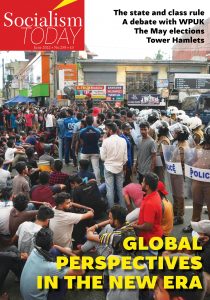
The recent national congress of the Socialist Party, held from 14-16 May, began with a discussion looking at global developments and perspectives for national conflict, economic crises, and the struggle for socialism. Here we reproduce the introduction to the discussion, made by the Socialist Party general secretary, HANNAH SELL.
Today we are assessing the world that is emerging on the other side of the Covid pandemic. It threw all aspects of society into flux. It has created enormous economic uncertainty and increased tensions between nation states, different sections of ruling elites and, above all, between classes.
Of course even now the pandemic is not over. Part of the reason that the Chinese regime has set its lowest growth rate target in three decades is that it is struggling to deal with a huge surge in Omicron. There are currently 290 million people in harsh total lockdowns, which are increasingly ineffective and unpopular. There are numerous reports of people in Shanghai protesting because they have been locked down without food for days at a time. Nonetheless, on a global basis – while Covid is still an ongoing cause of stress in people’s lives, and a disruptor of the economy – it is increasingly becoming seen as an endemic disease: one more problem that society has to deal with.
Read more